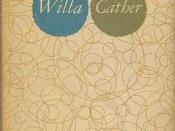For a short story to be effective, it must be able to produce high levels of intensity, emotion and drama. To do this, it must convey a great deal of information in a short space of time. As a result, the short story usually leaves a great deal of its content open to interpretation and examination by the reader. Also, the denouements of short stories frequently remain inconclusive and unfulfilled. Together, these attributes add to the action and intriguing character of this genre of literature.
An essential element of the short story is to make the personal events experienced by the characters universally understood by the reader. The story must present themes which are relevant to the reader, in order for it to make an impression. For this reason, short stories tend to be based on some type of controversy or debatable issue. In Sinclair Ross' highly metaphorical short story "The Painted Door", the explicit theme is centered on adultery.
However, there are other, more subtle, motifs in the story that play a very significant a role in its success. The themes essential in making the protagonist's adultery understandable are the landscape, her isolation, and the feelings of betrayal and guilt that she experiences following the central act of the story.
A great deal of this story is spent describing Ann's environment, both inside and outside her house. The story takes place in the past, before automobiles or telephones. Ann and her husband are settlers in a largely uninhabited and desolate area of North America (perhaps Saskatchewan). The starkness of the land is described early in the story: "Scattered across the face of so vast and bleak a wilderness it was difficult to conceive [the distant farmsteads] as a testimony of human hardihood and endurance." (246).
Page Two...


